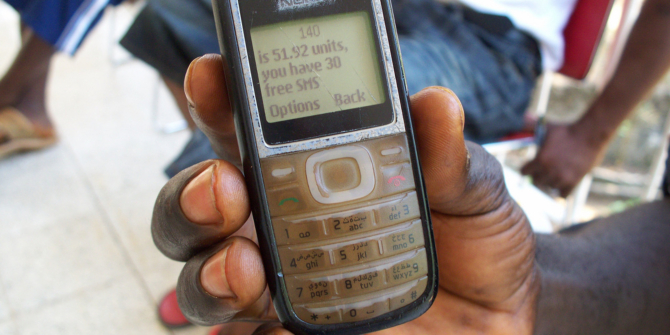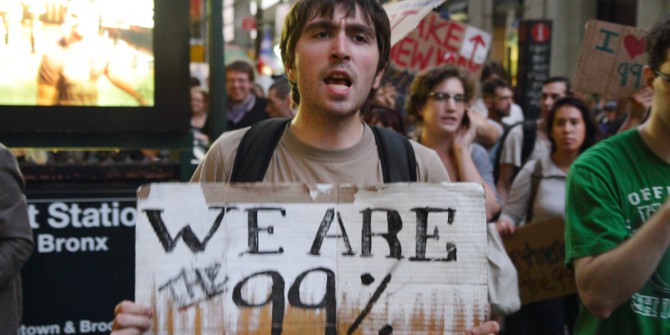With the emergence of a new strain of the virus that causes COVID-19 re-opening debates about the economic impact of the pandemic, the success of efforts to achieve global distribution of vaccines and the value of travel bans, The Initiative on Global Markets invited experts to express their views on these issues. Romesh Vaitilingam summarises their views.
In early December, we asked our panels of experts whether they agreed or disagreed with three statements on the potential economic effects of the new variant, the importance of distributing vaccines for Africa as opposed to investing in booster vaccination in rich countries, and travel bans, and, if so, how strongly and with what degree of confidence. Of our 43 US experts, 42 participated in this survey; of our 48 European experts, 34 participated – for a total of 76 expert reactions.
Potential economic effects of the new variant
Statement 1: Even without renewed COVID-19 restrictions, uncertainty about the health threat from the Omicron variant is likely to deliver a significant hit to economic activity from now through the first half of 2022.
On this first statement, just under half of respondents express uncertainty while a slightly smaller share agrees. Weighted by each expert’s confidence in their response, 6% of the US panel strongly agree, 37% agree, 54% are uncertain, and 3% disagree. Among the European panel (again weighted by each expert’s confidence in their response), 52% agree, 43% are uncertain and 5% disagree. Overall, across both panels, 3% strongly agree, 44% agree, 49% are uncertain, and 4% disagree.
Among the short comments that the experts are able to include in their responses, Christopher Udry at Northwestern, who strongly agrees with the statement, says: ‘I’m not sure of the timing, but as long as there is uncertainty about or confirmation of a health threat, activity will be slow.’ Nicholas Bloom at Stanford, who agrees, remarks: ‘It will be a hit, but not sure what “significant” means – I might think 0.1% to 0.5% of GDP, which is something but not huge.’
Others who agree outline possible mechanisms. Larry Samuelson at Yale notes: ‘Covid consumes resources and affects behaviour, even apart from explicit restrictions, with detrimental economic effects.’ And Jan Pieter Krahnen at Goethe University Frankfurt comments: ‘Omicron tells us that the pandemic is here to stay for much longer. This should have significant present value effects.’
Austan Goolsbee at Chicago explains: ‘Just depends on how sick it makes people. But fear is the main driver of economic damage, not lockdown’, adding a link to his Journal of Public Economics study with Chad Syverson of the potential drivers. Jose Scheinkman at Columbia also alerts us to research indicating that economic contraction is caused by the virus and occurs regardless of social distancing laws: ‘See Sheridan et al. PNAS 2020 on economic effect of COVID-19 in Sweden in the absence of restrictions.’ Similarly, Robert Shimer at Chicago, one of a handful of respondents who disagrees, comments: ‘Uncertainty about Omicron will be resolved within weeks. If the outcome is bad, then the variant (not uncertainty) will hit the economy.’
Among the plurality of experts who say they are uncertain, several comment on our lack of knowledge about the new variant. Paul De Grauwe at the London School of Economics: ‘There is still so much uncertainty about the nature of Omicron that very little can be said about its implications for the economy.’ Lubos Pastor at Chicago adds: ‘Will depend on how deadly Omicron will turn out to be. If benign then we should be OK. We will find out in the near future.’ And Darrell Duffie at Stanford observes: ‘Perhaps yes, but there is also a decent chance that Omicron will have high a R and low health impacts. That would be a good outcome.’
Others who vote uncertain point to additional factors. Christian Leuz at Chicago replies: ‘Not sure it will be significant and how to separate it from slow-down in activity in Europe due to rising infections even prior to new variant.’ And Aaron Edlin at Berkeley states: ‘People may be willing to take risks now. Future very unclear.’
Vaccines for Africa
Statement 2: If world vaccine supply continues to be limited, global social welfare would rise by more if those vaccines were made widely available across Africa (with support for effective delivery) rather than accelerating booster vaccinations in rich countries.
Nearly three-quarters of the panellists agree with the statement. Weighted by each expert’s confidence in their response, 25% of the US panel strongly agree, 49% agree, 22% are uncertain, and 4% disagree. Among the European panel (again weighted by each expert’s confidence in their response), 7% strongly agree, 67% agree, 23% are uncertain, and 3% disagree. Overall, across both panels, 16% strongly agree, 57% agree, 23% are uncertain, and 4% disagree.
Among the panellists who agree or strongly agree, William Nordhaus at Yale declares: ‘As close to clear as any question in Booth history [of IGM panels].’ Darrell Duffie adds: ‘Beyond its fairness, this strategy lowers risks of adverse mutations. Legacy COVID can be contained. Breeding new COVID variants is risky.’
Judith Chevalier at Yale agrees with the statement but adds: ‘Though the best answer seems to be substantial investment in BOTH.’ Antoinette Schoar at MIT also agrees but suggests: ‘The answer depends on the marginal effectiveness of a booster versus vaccinating more people, which is a topic of immunology not economics.’
David Autor at MIT says: ‘Social welfare of developing countries deserves great weight’; Christopher Udry adds: ‘Possibly even US social welfare; certainly global welfare’; while Kenneth Judd at Stanford, who says he is uncertain, argues: ‘There is a problem today but it is only because of the shameful lack of US leadership in 2020’, linking to his website comment on world supply of vaccines.
Several panellists express caution about the idea of global social welfare. Daron Acemoglu at MIT remarks: ‘Global social welfare is not well defined. Recovery in the West important for the world economy. But overall agree on humanitarian grounds.’ Aaron Edlin comments: ‘It depends on what social welfare means. But lives may be saved by deploying vaccines where transmission and prevalence is highest.’ Jose Scheinkman notes: ‘Not sure about “global welfare” but externalities of vaccination including emergence of VOCs [variants of concern] justify reallocation of resources to Africa.’ And Robert Shimer concludes: ‘Global social welfare is hard to define, but this would save lives.’
A number of panellists who agree comment on the challenge of vaccine delivery and take-up. Carol Propper at Imperial College London states: ‘The issue is effective delivery support.’ Patrick Honohan at Trinity College Dublin concurs: ‘Yes, but “last mile” issues increasingly seem to be the binding constraint.’ And Nicola Fuchs-Schundeln at Goethe University Frankfurt says: ‘I agree, but it is not only Africa, and the effective delivery is a very important caveat.’
Similar concerns are voiced by panellists who say they are uncertain or disagree. Charles Wyplosz at the Graduate Institute, Geneva notes: ‘There are widespread reports that people are opposed to vaccination. There is no shortage of vaccines in South Africa, for instance.’ Pinelopi Goldberg at Yale adds: ‘So far Africa has not been much affected by COVID. The problem is more on the demand than on the supply side.’ And Steven Kaplan at Chicago responds: ‘My sense is that a number of African countries cannot distribute the vaccines they have.’
Others who are uncertain note the difficulty of making a trade-off between vaccines for Africa and boosters in rich countries. Richard Thaler at Chicago says: ‘Hard to administer the Pfizer and Moderna to much of Africa so the opportunity cost of those shots may be low.’ Larry Samuelson comments: ‘We need both to bring the pandemic under control; assessing the relative merits of either alone requires expertise I do not have.’ Nicholas Bloom adds: ‘Depends on who is getting the vaccine – older developed country citizens tend to have co-morbidities so may benefit from boosters.’
Travel bans
Statement 3: Imposing travel bans on countries where new COVID-19 variants are discovered will make it less likely that countries will reveal new variants to the rest of the world.
Nearly two-thirds of total respondents are in agreement, but there is a difference across the panels, with three-quarters of the US experts agreeing but only just under half of their European counterparts.
Weighted by each expert’s confidence in their response, 21% of the US panel strongly agree, 55% agree, 18% are uncertain, and 6% disagree. Among the European panel (again weighted by each expert’s confidence in their response), 21% strongly agree, 27% agree, 39% are uncertain, and 13% disagree. Overall, across both panels, 21% strongly agree, 43% agree, 27% are uncertain, and 9% disagree.
Among the comments of those who agree, Darrell Duffie notes: ‘The moral hazard seems clear. If one is punished for revealing, one is less likely to reveal.’ Nicholas Bloom adds: ‘The travel ban on South Africa is politics trumping policy – now no country will announce a new variant for fear of getting a travel ban.’ And William Nordhaus concludes: ‘Hard to know whether science or politics will win out on this one.’
There are some differences of opinion among the experts on the value of travel bans. On the one hand, Robert Shimer states: ‘Travel bans were and are misguidance, though it’s not clear how much this will affect variant revelation’; and David Autor comments: ‘Plus, this does almost no good. Vaccines effective, travel bans ineffective.’
In contrast, Joseph Altonji at Yale protests: ‘Bans do reduce incentives to reveal information, but that does not mean that travel bans are not warranted in some cases.’ Oliver Hart at Yale suggests: ‘There may be other ways to compensate countries for disclosing while still having travel bans.’ Larry Samuelson adds: ‘But I expect the effect to be quite small, given that a new variant cannot be concealed for long and revelation brings some advantages.
Several other panellists comment on this issue of whether countries are in practice able to conceal any discoveries of new variants. Austan Goolsbee remarks: ‘Not so easy to keep a secret with a massively contagious disease.’ Charles Wyplosz adds: ‘Could be. But few countries are equipped to detect variants early on and most of those who are equipped are unlikely to (be able to) hide.’ And Pinelopi Goldberg comments: ‘It is hard to hide COVID. And countries, especially in the developing world, need assistance from other countries, hence they share information.’
♣♣♣
Notes:
- The survey is conducted regularly on different topics by The Initiative on Global Markets, of the University of Chicago Booth School of Business. All comments made by the experts are in the full survey results for the US panel and the European panel.
- The post represents the views of its author(s), not the position of LSE Business Review or the London School of Economics.
- Featured image by geralt, under a Pixabay licence
- When you leave a comment, you’re agreeing to our Comment Policy.





